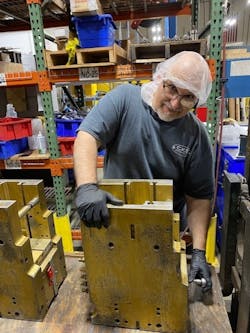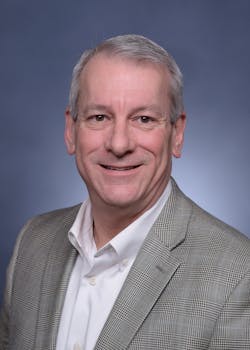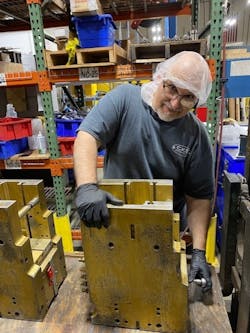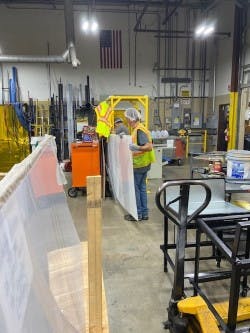Second Chance program buoys company, gives workers a new start
By Karen Hanna
But firing wasn’t top of mind.
Instead, Lloyd Martin — now senior VP of manufacturing — went to the man’s home and rapped on the door. Jon, the worker, was surprised to see him.
“He goes, ‘Well, I’ve been sick, and, and I didn’t think I should come to work sick,’ ” Martin said. “And I said, ‘Well, you’re right, you’re right, but you need to call and let us know.’ ”
“He goes, ‘With what?’ ”
Jon, it turned out, had no phone.
Called to help
Over the years, CKS has become a refuge for people who in many ways have run out of luck, whether because of homelessness, substance abuse or poor decisions. But the blow molder doesn’t give up easily. While other employers are still struggling to find workers, the company has become aggressive in lowering traditional barriers to employment — in the last five years, it’s sought out applicants among the unhoused and formerly incarcerated.
As of August, at least 10 percent of the custom packaging maker’s 3,000 employees had come from a background that includes time behind bars. The company’s practice of employing people who have served time in jail or prison — an approach known as Second Chance or Fair Chance hiring — embodies a belief that people’s worst choices and mistakes shouldn’t define them.
“We’ve had people that had gone through divorces, that their job performance really suffered. We’ve had substance abuse. … So, my team and my facility have tried to be good about that with people all the time,” said Bill Padgett, the operations manager of CKS Packaging’s two facilities in Naugatuck, Conn., which are devoted to blow molding, as well as decorating and warehousing, parts. “So, [providing] the second chance was almost somewhat of a natural thing for my team.”
How CKS sets the stage for success
CKS’ Arvanites shines when given another shot
A member of the Marine Corps prior to working in the plastics industry, Padgett believes being a leader is more than just enforcing policies — it’s supporting people in their struggles and championing their successes. “Yes, we have rules and regulations, and we try to stay within them for the good of all of us. But people need help at times,” he said.
Offering a Second Chance
According to a U.S. Chamber of Commerce report about the benefits of hiring formerly incarcerated people, about 70 million people in the U.S. have an arrest or conviction record. Once they return home from prison and jails, they often struggle to hold down jobs — one report cited by the White House recently put the unemployment rate within the demographic at 27 percent in 2008. Another report, released last year by the U.S. Department of Justice, found that about one third of a group of people it tracked over 16 quarters never found formal employment after their release from federal prison in 2010. For those who did, manufacturing was a major source of opportunity — with around 12 percent of the people in the study employed in that sector in any given quarter.
For CKS, efforts to help people in such circumstances began as a way for leaders to live out their Christian faith. But over time, the private company has seen its policies have helped it gain an edge in a crowded labor market, Martin and Padgett said.
“Thousands of people are being released every week. I wish I could hire them all, but we don’t have that many openings,” Martin said.
According to the Office of the Assistant Secretary for Planning and Evaluation at the U.S. Department of Health and Human Services, more than 600,000 people leave state and federal prisons each year.
Rich DiFelice — whom Padgett calls “one of my success stories” and “a great find” — is one of them. He came to CKS’ attention through an unusual connection — a CKS employee who had worked as a prison guard had sometimes monitored him behind bars.
“I worked in the supply room for over 20 years,” DiFelice said. “Basically, that's unprecedented because the average person probably worked the same job for probably six months.”
The length and reality behind DiFelice’s prison stay is particularly brutal — he spent more than 26 years in prison for felony murder.
He was 30 then, he’s 59 now.
Since coming to CKS about 17 months ago, DiFelice has been learning the ins and out of the mold room; eventually, he thinks he’ll be in charge of the shop, when his boss — a mentor the company assigned to guide him — retires. It’s a great opportunity — closer to where he lives, and with a better salary than the first job he landed when his sentence was up.
“Since I’ve been out, I've tried to lend a hand to people. … Whether it’s staying and helping them with their flat tires, or rides or whatever. … As people will open their heart to you, you try to open to your heart to them,” DiFelice said.
He calls the experience a blessing.
“When you leave the confines of the prison society and just walk onto the outside, the opportunities are, I would say, slim to none because there's a lot of judgment,” he said.
Putting the past aside
Martin said he knows what it’s like to have a background that’s a bit complicated to explain because like Padgett, he has ties to the military — his father was in the U.S. Air Force when he was a kid. Having grown up in 16 states and three countries, he could relate when an employee confessed to not knowing how to answer, “Where are you from?”
The employee didn’t want anyone to know his last address was prison.
Learning how to relate, as well as how to access resources, has been part of the growth process for both CKS and its Second Chance hires.
“For anybody who’s had to move around — and I’ve moved around a lot in my life — establishing a friend, it takes a long time, right?” Martin said. “And then to establish one that you trust takes even longer. … Re-establishing friends is not an easy thing for a lot of people — and especially for ones that have a history that they really don’t want to talk about. So, you’ve got to help them figure that out; they need a new circle of friends, a new circle of mentors.”
But fitting in isn’t just a matter of finding friends to meet around the water cooler. For people who often leave prison with little more than the clothes on their back, survival and freedom are at stake.
The ACLU’s report, “Back to business: How hiring formerly incarcerated job seekers benefits your company,” spotlights the problem.
“Without work, formerly incarcerated individuals can fall back into criminal behavior and are likely to end up on public assistance programs,” it said.
The report says nearly 75 percent of formerly incarcerated individuals are still unemployed a year after release, and “research has found that joblessness is the single most important predictor of recidivism.”
With the stakes so high and reintegration so difficult, CKS has taken on challenges many employers never consider. Where do people live? How do they get to work? Do they know how to handle their first paycheck?
As an example of some of the ways CKS has had to intervene on behalf of workers still trying to adjust to work expectations, Martin cited a problem with turnover at the company’s Kansas City plant.
When he looked into it, he realized the issue wasn’t with the company’s workers at all — it was with the transit system on which they relied.
“Long story short, we found out that the transportation system really didn’t work. … So, we bought a van. … We also worked with the transit authority, and we rerouted some of the busing.”
In another case, co-workers purchased a bicycle for a man who couldn’t find a reliable way to get to work, he said.
Seizing on opportunity
Working together to address the problems that people confront both at work and outside the plant walls has brought benefits to both CKS and its workforce, Martin, Padgett and DiFelice said.
“It’s been great. I mean, the benefits, the employment itself, the fact of being needed and valued as not only an employee, but just as a person in general,” DiFelice said. “Very, very grateful.”
The opportunity to learn is “exhilarating,” he said.
Statistics show Second Chance hires like DiFelice tend to repay the companies that hire them with loyalty and productivity. According to the Second Chance Business Coalition, a network of large private companies that hire people with criminal backgrounds, 82 percent of managers and 67 percent of human resources (HR) professionals report their Second Chance employees bring as much value — or more — to their workplaces than workers who have no records.
“On balance, Second Chance hires are highly loyal and productive employees. Additionally, research shows that Second Chance hires have lower turnover rates, which saves companies money,” the coalition says on its website.
The benefits show up in businesses’ taxes, as well. The federal Work Opportunity Tax Credit gives employers who hire a qualified ex-felon a tax credit of up to 25 percent of the employee’s first year’s wages if he or she works at least 120 hours, and 40 percent if the term of employment extends to 400 hours or more.
Maximum allowable credits can total $2,400 for each employee who has worked between 120 hours and 400 hours in a year, and $6,000 for each employee with more hours of service.
DiFelice said working at CKS has helped him a lot.
“I’m planning to make everyone proud of myself, just professionalism, and learning every day,” he said during a brief break on a day in August after he’d spent the morning learning some new tasks in the toolroom.
“The work’s challenging, every day is something new,” he said.
“We didn’t start out … it wasn’t a plan to basically find people where we needed talent originally. It was more about helping people get their life started and give them a second chance. But it turned out that it’s a good source for finding talent. … You know, we’re all just one poor choice away from possibly getting in trouble,” Martin said.
In August, the company was celebrating yet another transformation — a Second Chance worker, named Chaz Arvanites, who had come to CKS while receiving services from SafeHouse, an Atlanta social services organization that provides referrals to those in need of resources such as food and housing. In addition to rising through the ranks to become a warehouse and parts manager for CKS, he’s now a board member of the organization that helped him.
Martin concedes that not all workers pan out, but many have, adding their stories to his growing list of lives turned around. Their work underlies the company’s success.
He’s proud of CKS’ role in helping people like Arvanites and DiFelice find a home.
“It's really taught us to seek first to understand, and then to be understood, and really get the perspective of all of our employees, not just Second Chance employees — but all of our employees — and understand what their difficulties are and get their perspective,” Martin said. “Let’s work with them, before we just apply our policy toward them, and just leave them out there without a job, without a career, without a life.”
Karen Hanna, senior staff reporter
About the Author
Karen Hanna
Senior Staff Reporter
Senior Staff Reporter Karen Hanna covers injection molding, molds and tooling, processors, workforce and other topics, and writes features including In Other Words and Problem Solved for Plastics Machinery & Manufacturing, Plastics Recycling and The Journal of Blow Molding. She has more than 15 years of experience in daily and magazine journalism.



